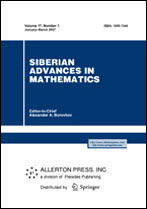|
Superlarge deviations for sums of random variables with arithmetical super-exponential distributions
A. A. Mogulskiĭab, Ch. Pagma
a Sobolev Institute of Mathematics, Siberian Branch of the Russian Academy of Sciences
b Novosibirsk State University
Abstract:
Local limit theorems are obtained for superlarge deviations of sums $S(n)=\xi(1)+\dots+\xi(n)$ of independent identically distributed random variables having an arithmetical distribution with the right-hand tail decreasing faster that that of a Gaussian law. The distribution of $\xi$ has the form $\mathbb P(\xi=k)=e^{-k^\beta L(k)}$, where $\beta>2$, $k\in\mathbb Z$ ($\mathbb Z$ is the set of all integers), and $L(t)$ is a slowly varying function as $t\to\infty$ which satisfies some regularity conditions. These theorems describing an asymptotic behavior of the probabilities $\mathbb P\bigl(S(n)=k\bigr)$ as $k/n\to\infty$, complement the results on superlarge deviations in [1, 2].
Key words:
arithmetical super-exponential distribution, integro-local and local theorems, superlarge deviations, deviation function, random walk, Gaussian approximation, Poissonian approximation.
Received: 31.01.2007
Citation:
A. A. Mogulskiǐ, Ch. Pagma, “Superlarge deviations for sums of random variables with arithmetical super-exponential distributions”, Mat. Tr., 11:1 (2008), 81–112; Siberian Adv. Math., 18:3 (2008), 185–208
Linking options:
https://www.mathnet.ru/eng/mt118 https://www.mathnet.ru/eng/mt/v11/i1/p81
|


| Statistics & downloads: |
| Abstract page: | 363 | | Full-text PDF : | 101 | | References: | 66 | | First page: | 2 |
|





 Contact us:
Contact us: Terms of Use
Terms of Use
 Registration to the website
Registration to the website Logotypes
Logotypes









 Citation in format
Citation in format 